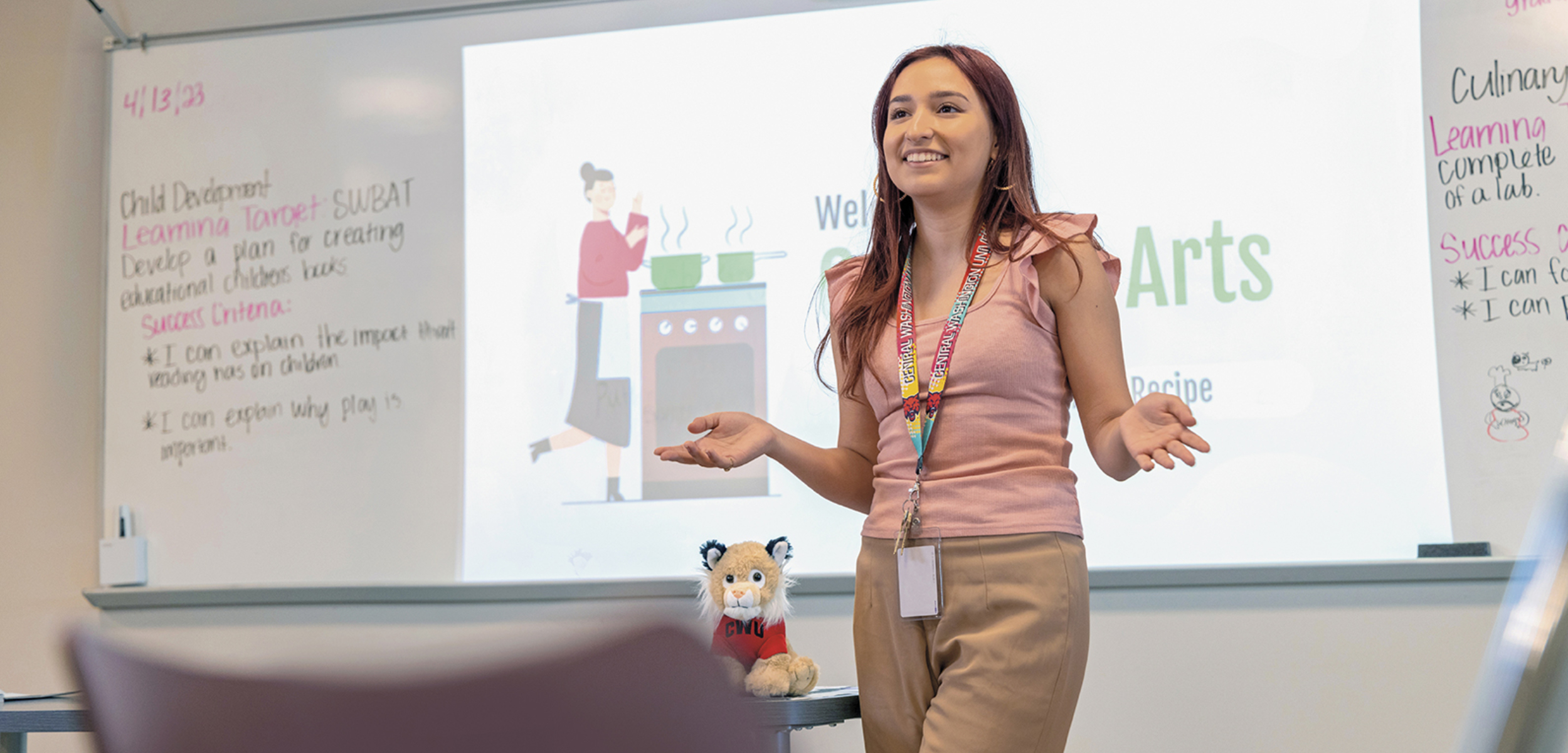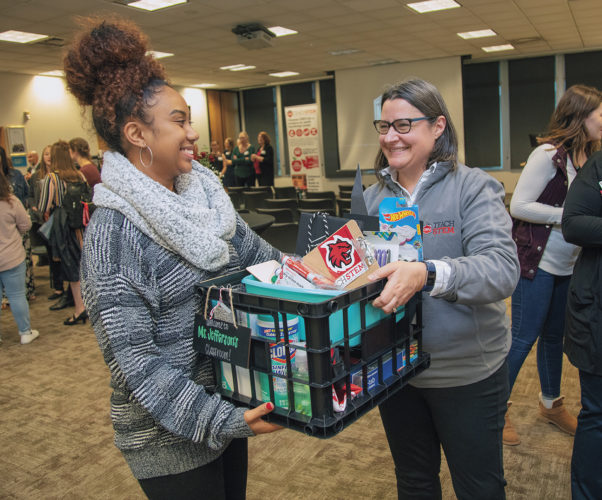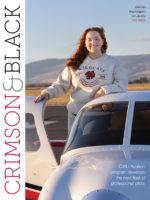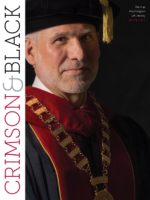
In 1891, the Washington State Normal School opened its doors in Ellensburg, tasked with educating the teachers of tomorrow.
The institution blossomed into what we know today as CWU, expanding its scope into a full-fledged state university and educating professionals in a wide variety of fields.
While Central’s selection of degrees may have broadened over the past 132 years, teacher education has remained at the heart of what we do. Learning experiences that change how we see the world and ourselves are why we’re here.
Jennifer Dechaine, director and associate dean of the College of Education and Professional Studies, sees a bright future for teacher education at CWU, and an opportunity for us to do even more good with the communities we serve.
“We have a great opportunity to be improving and developing our partnerships with school districts and communities,” Dechaine said, “and creating that holistic system to meet future teachers when they’re in high school and giving them a seamless pathway to their own classroom. I look forward to seeing that all come together.”
In an effort to set students on this path even before they get to college, CWU has partnered with more than 20 schools statewide on the innovative Teacher Academies program. Since 2009, these partner schools on both sides of the Cascades have been introducing high-schoolers to the fundamentals of teaching during their senior year, in the form of a dual-credit class.
The teachers who conduct these classes partner with CWU faculty to ensure that the curricula align with Central’s programs and objectives, providing students with opportunities to spend time assisting elementary school teachers and helping them get a feel for the profession.
Ingrid Valencia, who is graduating this spring, has been hired back to Grandview High School, the very same school where she first attended a Teacher Academy. She noted the program was what initially inspired her to pursue a teaching career.
“If it wasn’t for the program, I wouldn’t even have considered education,” she said. “But because I joined Teacher Academies, I was able to explore it prior to coming to college. I made up my mind to pursue it here at Central.”
Beyond her personal experience, Valencia says the Teacher Academies are helping teachers feel more connected to their communities—something the state is trying to do more of as it seeks to diversify its educator workforce.

Teach STEM Co-Director Allyson Rogan-Klyve, right, hand-delivers a classroom supply basket to CWU education graduate Amber Jefferson at a CWU-Des Moines event. ABOVE: CWU Teacher Academies helped graduating senior Ingrid Valencia decide to pursue a career in education. She will be teaching in her hometown of Grandview this fall.
“It’s positively impacting people in a lot of different ways,” she said. “Besides helping to alleviate the teacher shortage, it’s asking people to come back and teach in the communities they were part of in high school, which is a really great opportunity, especially for more rural areas that need more teachers. It makes the teachers a lot more connected to their students and their community.”
•••••••
Helping Fill the Void
As the nation grapples with a teacher shortage that was exacerbated during the pandemic, Washington has taken a nuanced approach to solving the problem.
Rather than simply focusing on educating as many teachers as possible, there’s a statewide focus on ensuring that children have teachers who properly represent them in their own communities. One of the ways the CWU School of Education hopes to meet this need is through a recently awarded Leaders in Education Advancing Diversity, Equity and Racial justice (LEADER) grant, which will fund the development of a regional community partnership aimed at diversifying the teaching workforce in an equitable, culturally responsible way.
The $150,000 grant will fund collaboration and research into a plan tailored to specific teacher needs in the North Central Washington region. After examining community needs and resources for two years, CWU will submit its plan to the Legislature for approval for additional funding to put the plan into motion.
Mónica Medrano, the regional director of CWU-Wenatchee and CWU-Moses Lake, says that in addition to forging new pathways for students and educators alike, this work seeks to help educators unlearn some habits that might be contributing to problems with diversity in the K-12 teacher ranks.
“It’s like this uncoupling of what’s been done and what’s been considered right, and asking ourselves how we start new and fresh to make sure we’re providing students with the opportunity to thrive in their pursuit to become educators,” Medrano said. “But it’s also to prepare them to be educators where they are going to be educating—to serve the students in their own communities, wherever they may be.”
•••••••
Hands-on Training
Diversifying the teaching profession across the state builds on CWU’s established reputation for fostering excellence in education. While the School of Education continues to seek out innovation, the teachers it produces are making their presence felt in the education landscape.
Just last summer, 2018 Elementary Education alumna Jenna Perry was awarded the Association for Supervision and Curriculum Development’s Young Educator of the Year Award for her efforts to create a welcoming and inclusive atmosphere in her Skagit County kindergarten classroom. Perry credits CWU’s teaching program with preparing her to do this important work and make a tangible difference in her community.
“There’s great inclusionary practices in Central’s courses that help prepare you for multilingual learners, so we leave equipped with the knowledge we need to teach, and teach well,” she said. “I love Central, and I love the education program, and I loved all of my professors. There are definitely some that stick with you.”
“You can’t do it without community partnerships; you can’t do it without high-impact practices. The direction we’re headed brings me the passion we’ll need to get there.”
—Jenny Dechaine, associate dean of the College of Educational and Professional Studies
Perry pointed to Professor Tim Lawless, who reached out to her when he learned of her award, remembering her and the work they had done together.
“The connections you make are so powerful,” she said, “and it’s those professors who help you make the most of your time at Central that exemplify what teaching is all about.”
Perry was hired to the same school where she did her student teaching, immediately after she graduated from CWU. She also grew up in the Burlington School District, and being back home has given her insight into the lives of her students, as well as how to best meet their needs.
“It’s all about connection,” Perry said. “Students aren’t going to be the best learners they can be unless they trust their teacher and feel like they can mess up without being judged. So much of the beginning of my school year is about making those connections and relationships.”
•••••••
Vision for the Future
Dechaine, from the School of Education, believes the work that the teacher education program is doing coincides nicely with the university’s new vision and mission statements, which emphasize the need for modeling what true equity and belonging look like in higher education.
“Thinking about our new vision and mission statements—expanding high-impact practices, sustainability, and community partnerships—teaching does all of that by nature,” Dechaine said. “You can’t do it without community partnerships; you can’t do it without high-impact practices. The direction we’re headed brings me the passion we’ll need to get there.”
“Washington State Normal School” is still emblazoned over the doors to Barge Hall to remind us of our roots. But as the CWU School of Education continues its mission to address the issues facing the teaching profession in the U.S., a future of teachers with deep connections to their communities and a commitment to fostering a welcoming, inclusive environment in their classrooms comes into focus.
If you ask Perry, it all comes back to that special CWU touch.
“There are teachers that you forge these connections with where if you’re just roaming around Black Hall, you can peek into classrooms and sort of wiggle your way into the back if the professor is someone you know,” she said. “It’s very comfortable, and they treat you not so much as a student, but more as part of their team.”






comments powered by Disqus